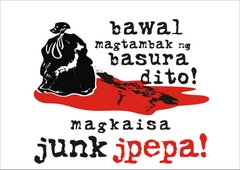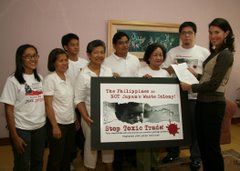Uphold the Integrity of the Public Hearings on JPEPA!
Reject the Treaty: The Moral Imperative!
We are at present at the heart of a raging controversy relating to the Japan-Philippines Economic Partnership Agreement (JPEPA), the unprecedented trade and investment pact between the two sovereign states that require the concurrence of members of the Senate.
We are in agreement with Sen. Mar Roxas that indeed, “No Deal Is Better than a Bad Deal”. In fact, it is more than obvious that a “stale food” can never be eaten from the very start. Undue haste, no public hearings nor documents, insisting that the JPEPA was an executive agreement and the secret dealings were national government actions before the treaty was transmitted to the Senate in 2006. These were clear signs that this treaty is nothing but a bad and immoral deal.
After the diligent holding of public hearings through the leadership of Sen. Miriam Santiago, we expect our Senators to perform their constitutional duty of rejecting the treaty. In all five public hearings, civil society groups from trade, environment, church, workers and like- minded sectors have proven to the citizens of this country that there is real proof for its outright rejection.
The Justice, Peace and Integrity of Creation Commission-Association of the Major Religious Superiors in the Philippines in support of the Magkaisa Junk JPEPA Coalition argues:
1. A central teaching of the Church is the fundamental equality of all human beings, having been created in the image of God (Genesis 1:26-27), which affirms the innate dignity of each person (CCC no. 2334). Humans as social beings come together in the spirit of solidarity to achieve what is for the good of all.
Thus any pact forged by the government with any entity, be it government or corporation, should not diminish our people’s dignity and give gratuitous preferential treatment to foreign nationals. It is a moral imperative to bar any move that will weaken the shared human dignity and the inalienable rights of a sovereign people that spring from it.
2. Another core teaching of the Church is the primacy of the common good – “the good of all and each individual” (SRS, 38), over and above the constricted interests of an individual, a family, a social class or a political party. The common good is "the sum total of all those conditions of social life which enables individuals, families, and organizations to achieve complete and efficacious fulfillment" (GS, 74). "The Church praises and esteems those who devote themselves to the public good for the service of all and take upon themselves the burdens of public office" (GS, 75). As a prophetic Church, we are committed to protecting the common good and social well being, working for justice and peace for all concerned (CCC nos. 1906-09).
Thus, it is essential for all political activities, including treaties negotiated by political authorities, to contribute to the fulfillment of the common good and not to agree with any lopsided arrangement that ignores or betrays the common good. It is a moral act to go against any deal that will reduce or demolish what is good for all.
3. The preferential option for the poor and the vulnerable is another teaching that should guide the Church and the society in the conduct of its affairs. As the purveyor of “good news to the poor” (Luke 4:1-22), the Church is tasked to "promote the good of every person and of the whole person;" (PP, 14) and is called to take her stand beside the poor and to discern and respond to their cry for justice (Sollicitudo Rei Socialis, Paragraph. 39). The Church believes that “excessive economic and social disparity between individuals and peoples of the one human race is a source of scandal and militates against social justice, equity, human dignity, as well as social... peace” (Vatican II, The Church in the Modern World, 29).
Thus a pact that is supposed to serve the national interest should be examined as to how its implementation will impact the lives of the poor and the vulnerable. It is a moral duty to side with the exploited, oppressed and marginalized in society, uphold their concerns, and to craft an agreement that is supposed to lift them from dehumanizing poverty.
4. Another Gospel-based teaching that we would like to emphasize is the value of caring for and protecting the natural environment, so that it is shared and preserved for the common good in line with God’s plan: He created man and woman in His image and charged them to be stewards of His creation (Genesis 1:27-28). Jesus, as told by St. John, saw His mission in this light. "I have come that they may have life and have it to the full." (John 10:10).
Thus it is vital that we scrutinize how an agreement will affect ongoing efforts to defend our natural resources from pollution, destruction and demise due to unfettered exploitation. “To put it simply: our country is in peril. All the living systems on land and in the seas around us are being ruthlessly exploited. The damage to date is extensive and, sad to say, it is often irreversible” (CBCP Pastoral Letter on Ecology: “What is happening to Our Beautiful Land?” 1988). It is our moral task to ensure that economic integration will not serve as a passport for globalized abuse and misuse of our fragile environment, including the development of market conditions for the illicit and unjust trade in toxic and hazardous wastes.
Guided by the Holy Scriptures and by the social and moral teachings of the Church, we see the non-ratification of JPEPA as necessary, just and morally right. Instead of concurring to a flawed agreement that breaches the Philippine Constitution and ignores the people’s aspirations for economic justice and environmental justice, we urge the Senate to censure and reject JPEPA for its barefaced failure to serve and uphold the common good. We trust that our Senators will decide on JPEPA with the welfare, security and health of all Filipinos at heart.
To address the threat of toxic waste dumping, we urge the Senate to ratify without further delay the Basel Ban Amendment as a counter-measure that will block the export of globally banned or restricted toxic and hazardous wastes from affluent generators like Japan to the Philippines and other developing countries.
To prevent our country from being shortchanged in future bilateral or multilateral negotiations, we urge the Senate to enact a law that will create the Philippine Trade Representative Office (PTRO) to facilitate a more coordinated, coherent, accountable, fair and equitable approach to trade negotiations and ensure full stakeholders’ consultation and participation.
Through the “principles of reflection, criteria for judgment and directives for actions” found in the social teachings of the Church an ethical and honorable decision on JPEPA is no other than upholding the merits of the arguments in favor of the country’s interest.
We pray that the Spirit of the Living God will illumine and guide you in making an ethical and moral decision with respect to JPEPA. Through the intercession of the Blessed Mother and San Lorenzo Ruiz, who with his suffering and death in Okinawa, Japan, taught us to live and defend our faith, may we continue with our journey for real development, justice and peace for the greater good of the whole creation. ##
Signatories:
Association of the Major Religious Superiors in the Philippines (AMRSP)
Dominican Family Justice Peace and Care of Creation-Asia Pacific Region
Missionary Society of St. Columban (MSSC)
Xaverian Missionaries (SX)
Xaverian Missionaries of Christ Jesus (XMCJ)
Medical Mission Sisters (MMS)
Siervas de San Jose (SSJ)
Sr. Cecilia Bayona, AMP
General Superior
Augustinian Missionaries of the Philippines (AMP)
Sr. Angie Villanueva, RC
JPIC Coordinator
Congregation of Our Lady of Retreat in the Cenacle (RC)
Sr. Elvira Valenzuela, MMS
Medical Mission Sisters (MMS)
Fr. Rey Caigoy, O.Carm
Order of Carmelites (O.Carm) Fr. Nelson Zerda, OSA
JPIC Coordinator
Order of St. Augustine (OSA)






No comments:
Post a Comment